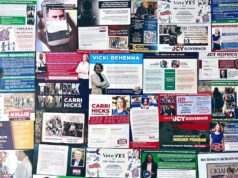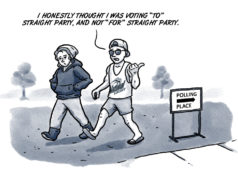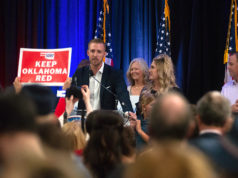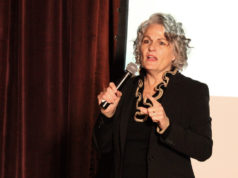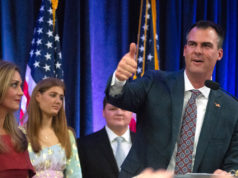BARTLESVILLE — With promises to kick President Joe Biden and Nancy Pelosi in the teeth, differing views on the McGirt vs. Oklahoma decision and boundless adulation for former President Donald Trump, 10 of the 14 candidates vying for the Republican nomination in Oklahoma’s 2nd Congressional District took part in a two-hour debate Monday night presented by NonDoc and News on 6 at the Bartlesville Community Center.
Each of the candidates played to their audience, a conservative GOP primary electorate looking for red meat. And the candidates delivered, firing broadsides at Democrats, the “woke mob” and even Ukrainian President Vladimir Zelensky.
CD 2 encompasses most of eastern Oklahoma from Texas to Kansas, including Muskogee and — after redistricting — Bartlesville. The seat has been held since 2012 by Rep. Markwayne Mullin, who is running for U.S. Senate.
With 14 candidates in the GOP primary, an Aug. 23 runoff is almost a certainty, with Democrat Naomi Andrews and independent Ben Robinson awaiting November.
Candidates lament McGirt fallout
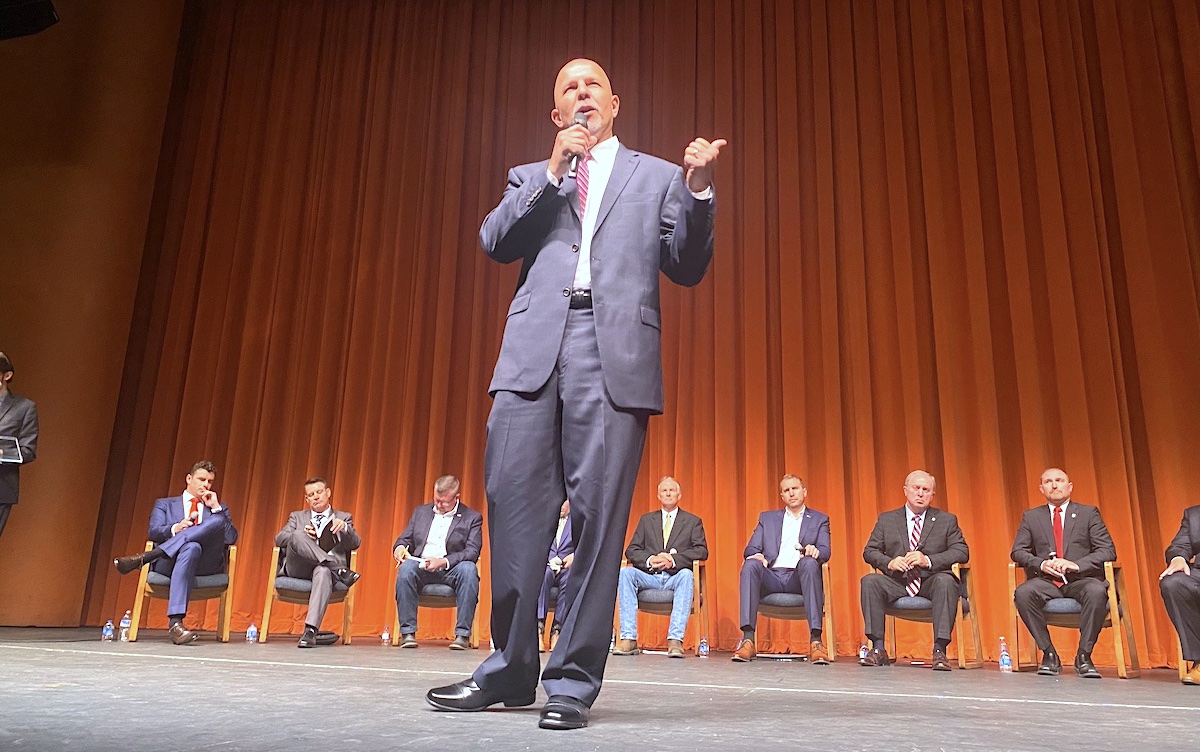
With eastern Oklahoma affirmed as Indian Country reservations owing to the July 2020 McGirt vs. Oklahoma SCOTUS decision, the topic became a major part of the debate. Virtually all of the candidates said McGirt has been problematic for their part of the state because the state no longer has criminal jurisdiction over major crimes committed by or against tribal citizens. Only the tribes and the federal government have prosecutorial authority.
Muskogee Police Chief Johnny Teehee said he fears for victims in the fallout from McGirt.
“The biggest issue we have is the victims that aren’t being taken care of, specifically when it comes to property crimes,” he said. “It’s something the tribes and the state and local governments need to find a way to work together on. The sovereignty issue is there, but the bottom line is victims should get justice.”
Former Rep. David Derby, who also works as a pharmacist, said he has spoken to local law enforcement about the issue and came away with concerns.
“I was in Stigler this past weekend, and I talked to the sheriff there,” Derby said. “He said McGirt has been catastrophic for that particular county and that he doesn’t understand or know how to prosecute perpetrators because he can arrest someone and then, two hours later, if they’re a tribal member, they’re back on the street.”
Rep. Avery Fix (R-Muskogee) said clarity on the jurisdictional landscape is needed.
“We definitely need to have clarity,” Frix said. “It has created a lot of challenges for us. We need to sit down with tribal leaders, and make sure all four million Oklahomans are protected. The McGirt decision has been like a bad divorce. The only people winning are the attorneys who are getting paid millions of dollars.”
Former Oklahoma Republican Party chairman and Rep. John Bennett said disestablishing the Muscogee Nation, which has the original reservation affirmed by the McGirt decision, would be a way to end the problems associated with the decision.
“The tribal governments are socialist governments that don’t recognized our Bill of Rights,” Bennett said, ignoring the fact that the tribes hold democratic elections. “They don’t get those rights. I say we need to disestablish the Muscogee [Reservation]. That would simply take us back to the day before the Supreme Court making the ruling. We’re not taking anyone’s sovereignty away.”
Bennett’s remark eventually led to an exchange between Cherokee National Council Member Wes Nofire and Bennett after Bennett said he thinks all parties need to sit down and work together.
“You can’t work with us if you’re going to disestablish us,” Nofire said to Bennett. “That’s the whole point. Whenever you’re going to say something like that and then come back and say, ‘Well I’d like to sit down and work with you guys.’ You said you were going to disestablish it.”
Asked to raise their hands if anyone else agreed with Bennett’s proposal for Congress to disestablish the Muscogee, Chickasaw, Cherokee, Choctaw, Seminole and Quapaw reservations, the other nine candidates on stage declined.
Ukraine plight draws little support
Despite Russia’s continued assault on the nation of Ukraine, which began in February and has resulted in at least 47,000 deaths, none of the Republican CD 2 candidates has much appetite to fight the Russians with American troops, or through aid to the Ukrainian military. Asked to raise their hands if anyone favored U.S. military action, none did. The candidates were similarly opposed to a recent $40 billion aid package approved for Ukraine.
Sen. Marty Quinn (R-Claremore) expressed possibly the strongest sentiment of support for Ukraine, although he said Russian President Vladimir Putin would not have invaded Ukraine if Trump had been president.
“Putin would have never gone into Ukraine, because they would have been too afraid,” he said. “Had Biden stood up to him in the beginning, not a dime would have been wasted. We say we don’t have to put any money into it, but what about the wheat? When they shut that off is that when we go in? We should have made sure we took care of things in the beginning.”
Bennett, who is a Marine Corps veteran, said the United States shouldn’t be assisting Ukraine at all.
“We don’t belong in Ukraine whatsoever,” he said. “If you’ve been to war, the last thing you want is to send family to spill blood and treasure. Zelensky is a war criminal and he needs to be out just like Putin does. They are laundering money there, and the communist Democrats and the communist media are not talking about it.”
Petroleum engineer and attorney Guy Barker said America’s needs must come first.
“This is something we’re going to have to be fighting now and in the foreseeable future,” he said. “We need to start prioritizing Americans not shipping money abroad in foreign aid.”
Candidates propose raising Social Security age

With the Social Security Trust Fund estimated to face future insolvency, candidates were asked how they would address funding issues for that benefit program in the future. None of the candidates was in favor of raising taxes, which some say is necessary to fund Social Security down the road.
Barker suggested that benefits may need to be cut for those receiving disability payments, and he said the age at which people can begin receiving traditional benefits could be raised because people are living longer.
“Life expectancy has far, far increased from where it was since when we started this program,” Barker said. “The other thing is we’re going to have to take a hard look at Social Security Disability. This is something that Social Security was never designed to handle. This is almost 25 percent of our national budget. And we ask ourselves why it’s growing insolvent. It needs to be capped, and it needs to be cut.”
Rep. Dustin Roberts (R-Durant) said Congress has put off addressing the problem of insolvency.
“We need a committee to look at all the issues and dive into the work that needs to be done instead of kicking the can down the road,” he said.
Roberts was unclear on whether he would support raising the current age when people can receive retirement benefits from Social Security.
“I think anything needs to be on the table with any issues facing America right now,” Roberts said.
Joe Biden, Nancy Pelosi popular targets
The candidates name checked Biden and Pelosi countless times during the debate, but perhaps no one attacked with more vigor than Derby. When asked if voters can trust he will not be influenced by pharmaceutical lobbyists if elected, Derby, who is a pharmacist, referenced his past work in the Legislature to keep prescription costs down.
“That’s the kind of leadership you’re going to have from me in the United States Congress to drive your prescription costs down to take on the PBM and DIR fees so that your prescription drug costs are lower and you see more money in your pocket and we can kick Nancy Pelosi and Joe Biden in the teeth,” Derby said.
Other candidates hit on the southern border and energy independence, including Bennett, who delivered fiery opening remarks.
“We need to put American borders first, and I say that we build that wall,” Bennett said loudly. “We need to put American oil first. I say drill baby drill and gain back our energy dependence.”
Candidates differ on Panasonic proposal
Candidates were also asked about what has been called “Project Ocean,” a new state program that could provide up to nearly $700 million in rebates if the Japanese company Panasonic decides to build a $4 billion battery plant at the Mid-America Industrial Park in Pryor.
Quinn, the Claremore senator, missed the April 21 vote in the State Senate on HB 4455. After some prodding, he said he would have voted for the proposal had he been present.
“I want to make sure if I’m taking tax dollars from you, I want there to be some kind of return on the investment,” Quinn said. “I want to make sure these things are all met and we’re building in a level of truth into these tax rebates and exemptions.”
Frix said he voted against HB 4455 because of the limited timeframe he had to consider it.
“I always support economic development, but I have to look and do my due diligence for the people who elected me,” Frix said. “We received this bill hours before we voted on it, so I didn’t have the time to adequately vet the bill, so I voted ‘No.’ It’s not because I’m against economic development but because I wanted to have proper oversight.”
Roberts disagreed with Frix’s statement, saying lawmakers had worked on HB 4455 for weeks prior to the House vote. Roberts said he supported the bill because the program has plenty of protections for taxpayers, noting that the company receives no money unless they meet investment and job benchmarks.
“As a member of leadership and as a member of the floor team, I’d seen what was there, and it was a good piece of legislation, especially for rural Oklahoma,” Roberts said. “We don’t have jobs in southeastern Oklahoma. A very sparse amount of jobs. Economic development is critical for the 2nd District, especially when it’s something that protects taxpayer dollars.”
(Correction: This article was updated at 7:15 p.m. Tuesday, June 21, to correct a quote attributed to Guy Barker. NonDoc regrets the error.)










